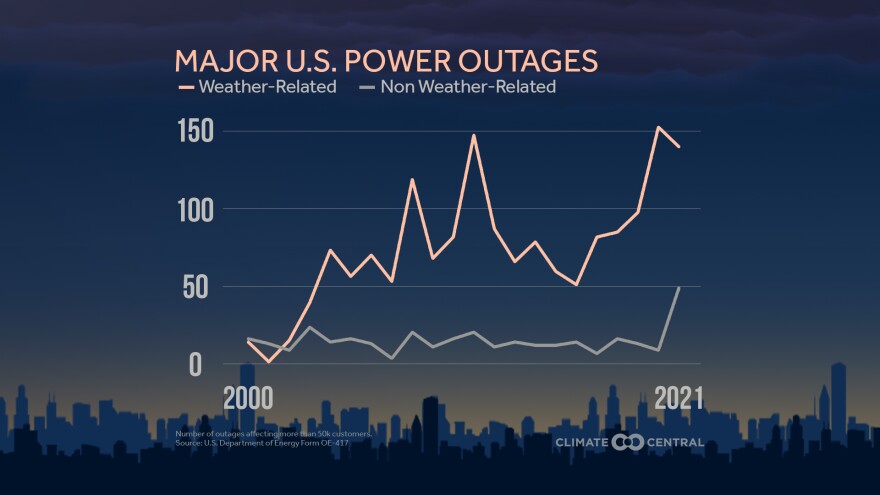A new report finds that 83% of major power outages between 2000 and 2021 were attributed to extreme weather. The analysis authored by Climate Central finds that Florida had the tenth highest number of outages in the nation.
The analysis uses data gathered from utility companies around the country and defines a major power outage as one impacting more than 50,000 customers. The criteria for a weather event vary from place to place. Climate Central finds that 58% of weather-related outages were caused by severe weather, such as high winds, rain, and thunderstorms. Another 22% is attributed to winter weather, 15% to hurricanes and tropical storms and a smaller number of outages could be attributed to extreme heat and wildfires.
Nationwide, outages are also increasing. The data shows 64% more major outages during the period of 2011-2021 than that of 2000-2010. An aging infrastructure with above-ground lines susceptible to increasingly intense weather due to climate change are cited as some reasons for the shift. Some events, such as recent heat waves in the West, increase a demand for electricity, which threatens to strain the system and cause rolling blackouts.

Data obtained from Climate Central reveals more details about impacts to Florida. The most common reason for outages is hurricanes, with 43 out of 65 outages in that category. The year with the most outages was 2004, with 20 major outages. Hurricanes Charley, Frances, Ivan and Jeanne all impacted Florida that year. The longest outage catalogued was in 2005 after Hurricane Wilma, lasting 17 days.
There are multiple risks to public health and safety following power outages. A lack of indoor climate control can be dangerous if accompanied by extreme heat or cold. Extended outages without refrigeration can threaten people's food supply. Those who rely on electricity for medical devices can be especially vulnerable. Large-scale outages can also affect other utilities, such as limiting the public's access to clean water if they haven't stored any themselves.
Families may choose to prepare for outages by purchasing generators but can be at risk if they don't use it correctly. The Consumer Product Safety Commission estimates 85 people die each year from carbon monoxide poisoning. Generators should never be used indoors or in an enclosed space, such as a garage. Open windows or doors may not be enough to prevent carbon monoxide poisoning, so generators should always be operated outdoors away from doors, windows and vents.
Copyright 2022 Storm Center. To see more, visit .




